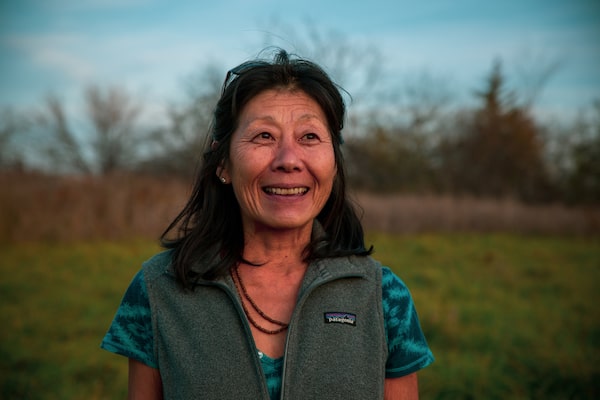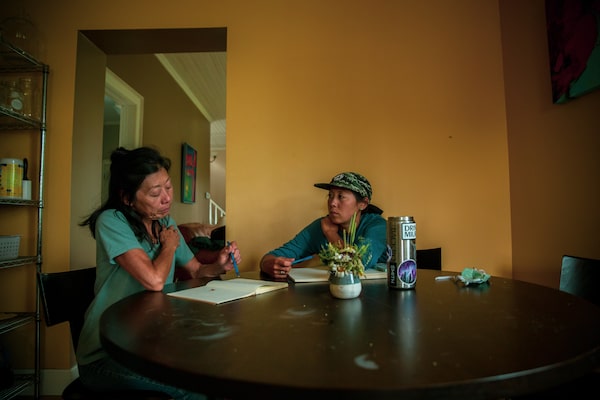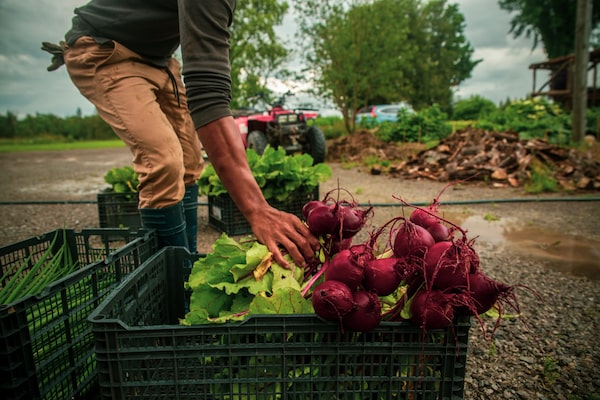Kimiko Uchikura, 62, grew up in Toronto to first-generation Japanese Canadians. She had taken over the family graphic-design business, as was the duty of the oldest child, but she never felt fulfilled by it. Following her divorce, she moved full-time to the family cottage in Bobcaygeon, Ont. She soon befriended the previous owners of this 167-acre property who were looking to rent a small plot of land on their farm for a personal garden. When the owners decided to sell suddenly in 2019, Kimiko jumped at the opportunity. She called it Merkaba Acres.

Kimiko Uchikura.
Climate Innovators and Adaptors
This is one in a series of stories on climate change related to topics of biodiversity, urban adaptation, the green economy and exploration, with the support of Rolex. Read more about the Climate Innovators and Adaptors program.
“I became interested in alternative health, healing, spirituality, and all of those things connect with nature,” Kimiko says.
“It wasn’t a lifelong interest or calling, but as I looked at my well-being, more and more of the focus was on what you eat, how you live your life. ... It all kept pointing to growing the things to feed yourself, heal yourself and feed your soul.”
The Merkaba is a sacred geometric shape. It represents light, spirit, body; energies coming together to grow. Kimiko always loved the symbol and had the name before she had the farm. She added two hearts to the Merkaba – which represent the balance of masculine and feminine energies – and created the farm’s logo. The vision for Merkaba Acres is to be a community project, allowing anyone who wants to live and work there in order to help restore the land and spread word about regenerative, sustainable farming.
Kimiko and Tessa hang their sign at the Bobcaygeon Farmer’s Market. Most people heard that the farm had new, unconventional owners, so the market offers an opportunity to become more visible in the community. 'I think we’re a curiosity,' says Kimiko.
“I never expected to do this; it just fell beautifully into place. I came to this land just to visit and suddenly they were offering it to me. I didn’t really understand what it was about this land, why it was so important to me.
Kimiko harvests salanova, a variety of leaf lettuce. An efficient way to grow salad mix, Salanova has three times more leaves than other lettuces.
“I may be the foundation, but the whole inspiration was to bring people together,” Kimiko says. “Not everyone has the opportunity to explore a passion, an inclination to grow things, or make things, or understand how nature works. There’s so many things that can happen here, and my goal is to have a space that gives that opportunity to as many people as possible.”
In the beginning, Kimiko ran the farm herself. She bought a tractor, cultivated four acres and tried to grow hemp for CBD production, which ended up being a struggle and not lucrative. After a year, she decided to shift strategies. Of 167 acres, only 40 acres are cleared. The rest of the property is home to wetlands and forested areas. The soil was never treated with pesticides, but also never fully utilized, so Kimiko started to build the soil health slowly.
“ My grandmother on my mother’s side was raised on a farm in Japan, and that family farm is still going 16 generations later. On my dad’s side, they were fishermen. So there has always been food in my roots.

Kimiko and Tessa review their plans for the following morning’s debut at the Bobcayeon Farmer’s Market.
Kimiko’s daughter, Tessa, worked for a bike tour company in Canmore, Alta., with her partner, Kieran. She lost her job during the pandemic and moved to the farm earlier than expected. Now, Kimiko and Tessa farm together. Kimiko brings the ideas; Tessa grounds them and brings plans to action. Every day they are up against a new challenge and aim to deal with it in the best way possible that is beneficial to the land, the crops and the animals.
“ Tessa and I have visited with so many farmers together. We don’t try to come off like we know what we’re doing, but rather this is something we want to learn. We’ve found our way to this place. And people have been so generous with their time and information.
The regenerative farm philosophy means every activity supports each other. Vegetables that don’t go to market are given to the chickens, who then supply the eggs, so that nothing is wasted.
The wagyu herd is moved to a new paddock every day with fresh forage to eat.
Merkaba now has 26 Wagyu cows, a Japanese breed famous for its heavily marbled meat. They had planned to rotationally grass-feed the cows, but have learned there are difficulties with fattening this type of cow on a grass diet. So they are adjusting their plans while still remaining organic. People have told them they won’t be successful raising these kinds of cows in Bobcaygeon, because Wagyu beef is a premium product never before seen in this area. But their beef sold well this season after launching online sales, and they found the majority of sales were from local people wanting to support their efforts.
“I didn’t want to be a beef farmer,” Kimiko says. “But I wanted animals grazing on the land to fertilize and stimulate it back into life. Raising animals is one of the fastest and best ways to build fertile soil. We care so much about those animals and want to give them the best lives possible. I really think our animals are happy. To me, that will produce the best food.”
Located on the Trent Severn Waterway about 90 minutes northeast of Toronto, Bobcaygeon bills itself as “not just any old cottage-country town.” It draws tourists and cottagers from cities to the south.
“I think we’re just a curiosity. A lot of people in the country don’t know a whole lot about Asian people. Bobcaygeon is starting to be more diverse, but I didn’t know another Asian family around here for the longest time. Typically farming is men, and white men, and a lot of the younger generation is leaving to go to the city to become modern people. … I’m doing this for the future generations, and I love how many young people are taking an interest. Stepping out and looking at different ways of living, eating, playing.”
“ Merkaba’s philosophy is about helping to shift consciousness. ... We are connected to every single thing, but we don’t learn that in school; and the more I do it the more I realize every little bug, every leaf, every single thing is unique.
“ Merkaba’s philosophy is about helping to shift consciousness. ... We are connected to every single thing, but we don’t learn that in school; and the more I do it the more I realize every little bug, every leaf, every single thing is unique.
At the end of another hard days’ work, Tessa takes in a beautiful sunset overlooking the orchard.
Last fall they hired a permaculturist to design an orchard, with hopes to begin cider production in the future. The property is home to 100-year-old apple trees that they will use to graft onto new trees and grow root stock. The trees won’t bear fruit for years, but it’s one of the long-term plans that will help the property become self-sustainable.

Beets are cleaned and ready to bring to the Farmer’s Market.
In July, Merkaba Acres had its farmer’s market debut in Bobcaygeon. The response was so positive they had to have a second load of vegetables brought from the farm because they were selling out. People were impressed with the size and colour of their produce, and many purchased Wagyu beef, interested in trying it.
Kimiko and her maremma dog Bo work on new signs to attract customers to the Farm Store. This summer, the Merkaba team transformed one of the property’s original buildings into a store to sell their fresh produce on site. It’s one way to share the farm with their community.
“ Regenerative means doing things in such a way that you’re contributing. You’re not just taking and using. Whatever you are doing, you are at least putting back. It’s not just maintenance but the regeneration of habitats, soil, putting things into an ecological balance. I feel it is our responsibility to make it as healthy and as vibrant a place as we can.
Vegetables for sale in Merkaba Acres’ on-site farm store, opened in July. Customers are invited to visit the property, and they see agro-tourism as a way to engage with the community while encouraging people to take an interest in sustainable farming and food practices.
Merkaba Acres now has an on-site farm store to sell their vegetables and meat, and has plans to invite the public for agricultural tourism tours. Eventually, they’d like to turn the barn into a farm-to-table restaurant or wedding venue. Burnout is common in farmers, so they are trying to balance workload as well as diversifying revenue streams. Each decision eases pressure on the other and allows for more experimentation. They are using this season to experiment with food varieties, learn what works well in the soil, what’s sustainable financially and time-wise, what bugs they attract and how to move forward without pesticides.
“There are so many decisions that you need to make daily. We research, we ask questions, but mostly it’s my gut that I’m following,” Kimiko says. “As you do this, your instincts really come on. You become intuitive. You begin to ask good questions of yourself. You have to speak your ideas, and often they will come true. Tessa often tells me to be quiet because everything I throw out there ends up coming true!”
Interested in more stories about climate change and exploration? Sign up for the Globe Climate newsletter and read more here